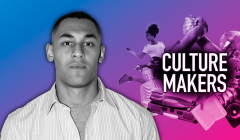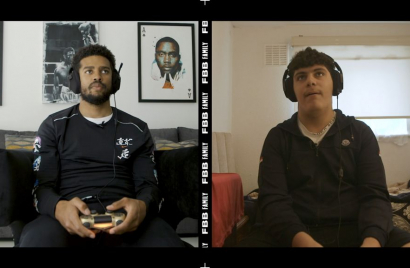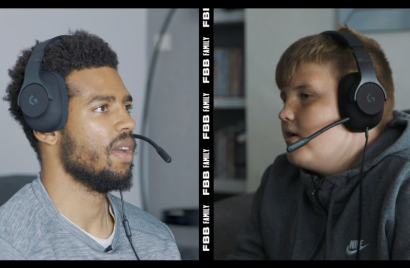
‘Subculture is the most powerful tool we have’
Louis Persent, Co-Founder and Creative Director at Weirdo on the power of embracing the niche

How Football Beyond Borders and Dark Horses turned to virtual worlds to build connections

As the coronavirus pandemic swept its way around the world, country after country went into nationwide lockdown. Schools closed, offices shut up shop and life as we knew it was paused, indefinitely.
Entire families were confined to their houses all day every day, partners were forced to live alongside each other every minute of every day, and their work alter egos, and children were barred from seeing their friends. The connection, and the community, many take for granted from our everyday existence disappeared almost overnight. And in its place came a world lived almost exclusively online.
While many businesses found this pivot next to impossible, others saw it as an opportunity to build connections through virtual worlds while physical connection was out of reach. This is what Football Beyond Borders (FBB) worked with Dark Horses to do; to keep its network of kids connected, supported and entertained throughout the ongoing lockdown.
As an educational charity that uses children’s love of football to engage them in their learning, FBB suddenly couldn’t rely on the pitches, fields and playgrounds they would ordinarily operate in. With one in eight young people in the UK suffering from mental health issues, however, offerings like FBB’s became perhaps even more vital as lockdown extended and schools remained closed.
The charity recognised that they needed to create a digital meeting ground for children, and this is where Dark Horses came in. They pivoted the programme to the realm of esports, specifically through FIFA, creating Football Beyond Walls in just four weeks to give children going through a particularly testing time a sense of belonging and companionship.
Nicola Kemp, Editorial Director at Creativebrief spoke to Jasper Kain, the Founder of FBB alongside Adam Burns, Creative Director at Dark Horses for the latest instalment of the Creativebrief Thriving Creative Partnerships series. As Kemp explained, FIFA became “the icebreaker for difficult but vital conversations.”
This time has forced us all to stop and consider our place in the world and potentially our privilege as well.
Jasper Kain
FBB’s original plan was to create a campaign around the 2020 UEFA European Football Championship but, once the tournament was officially cancelled, they had to pivot, rapidly. The charity typically works with around 1,000 young people each week in schools, with those children usually “underachieving and struggling,” Kain explains. It was these individuals that the charity were concerned about as the nation locked down.
FBB started off by running a series of interviews and focus groups with the young people and their families to get a picture of how they felt. As Kain explains: “A picture quickly emerged that our young people really, really missed their friends, they missed contact with adults, and they felt quite lonely.” Coupled with that was that “these young people had passions.” The team thought, “how can we engage our young people, give them a sense of belonging so that they can overcome this sense of loneliness and tap into things that they’re really passionate about?” Gaming quite quickly emerged as the unifying tool.
Burns elaborates on Kain’s point, revealing that when the creative team at Dark Horses got chatting about the campaign, they all concluded that “some of your most meaningful conversations with your friends as young men happen during that time,” playing FIFA. “Young people when they play have almost a detachment from what they’re talking about and it’s like an open space,” he adds. The team saw this as a moment to reconnect and bring the charity’s work to life. As Kain explains, “this time has forced us all to stop and consider our place in the world and potentially our privilege as well.”
The charity has trained psychodynamic counsellors that work with young people, ordinarily on a face-to-face basis with football “as the Trojan horse,” Kain says, that enables young people to express themselves. Kain talks of how school exclusions in the UK have gone up by 40% in the last three years, something the charity works to directly combat; 95% of FBB participants remain in mainstream education.
“There’s a lot of uncertainty in a young person’s life,” Kain explains. For FBB, they needed to connect the young people with the FBB staff and practitioners who they know and trust, to keep these relationships at the heart of what they do. The team’s guiding thought, Kain says, was “how can we try and give young people a sense of structure, give them a sense of routine and some degree of normality?”
This is where gaming came in. The teams acknowledge the addictive nature of online gaming; many young people play with their friends until the early hours of the morning. But instead of condemning this behaviour thus alienating the children, Kain says, they decided to “meet the young person where they’re at…[to] use the gaming experience so it can be beneficial to them.”
The idea for the campaign was about young people having open conversations with professional footballers while playing FIFA. For Burns, it was important to capture both the conversations but also the moments of game play that “break any tension.” This meant that the videos eventually released are revealing but authentic portrayals of the games played between the two boys, Freddie and Bland and the footballer Cyrus Christie.
FIFA was the leveller in a way, as Kemp says, “it seemed like a bunch of mates playing FIFA rather than a celebrity playing FIFA with a couple of young guys.” The campaign captured the energy of gaming, often seen as quite a stagnant, solitary activity. Burns also points to the importance of FBB’s expertise in helping to empower the young people to open up, and the professionalism of Christie throughout.
FBB, and this campaign, acts as a vehicle between football players that have a platform and are often figures of inspiration and young people who are aspirational but who have perhaps experienced stigmatisation because of their bad behaviour at school. Kain says that FBB, “wanted to provide that context where the synergy can emerge. And the gaming was just an amazing way of doing that.”
This was more about showing that gaming is a good space to have an open conversation and actually start a deeper conversation with a friend.
Adam Burns
The link between sport and gaming is often seen as a mutually exclusive one; gaming takes you away from the opportunity to get outside and get some fresh air. But FBB and Dark Horses are proving that doesn’t have to be the case. “The thing about gaming is there’s no barriers to entry,” Kain says. “Gaming was a complete equaliser.”
Burns reveals that around 230 million games of FIFA are played just on a Sunday. There’s no stopping young people from gaming so, he says, “the only choice is to use it as a force for good.”
“With our idea it wasn’t so much about talking about mental health on the nose,” he goes on to explain. “It was more about showing that gaming is a good space to have an open conversation and actually start a deeper conversation with a friend.”
Kain reveals that his approach to gaming was always focused on how they could limit the amount of time young people spend doing it. But actually, the solution was to flip that thought: “How can we use gaming to engage young people and support their development?”
“Football is a neutral tool. It can be used for good or bad. Football can bring out the best in humanity. It can bring friendship, motivation. But it can also lead to people being overly competitive, being resentful…Gaming similarly is a neutral tool that can be used positively or negatively,” Kain explains.
Playing a game of FIFA, Kain also adds, helps young people develop a sense of identity that is removed from their immediate family and home, something that has been particularly vital during the nationwide lockdown. For many of the young people involved in the FBB projects, growing up in urban poverty meant that those moments for development can be few and far between. FBB’s aim with Dark Horses is to “harness the potential,” of gaming, Kain adds.
Kain is quick to note that he is not saying gaming isn’t addictive. But rather that there are situations that arise in the game that allow the youth workers at FBB to create “teaching moments,” to explore what just happened, whether that be hurling the controller in a rage at a loss or storming out of the room. These moments help the young person to become more self-aware and give them the tools to manage their emotions. “Those lessons are then applicable when you get into the classroom or even into a work context,” Kain adds.


Both men talk about the importance of the virtual space when it comes to enabling and empowering young people to have more meaningful, and often difficult, conversations. For Burns, looking ahead, he says, “I would predict that you will see more, potentially charities or mental health organisations, using gaming or virtual interaction as a way to reach people.”
For FBB, their next steps involve the creation of a virtual summer school that will engage young people in what they are passionate about. One aspect will involve gaming, and that will have three features, as Kain explains: one is to get young people to think about their environment; second is exploring their passion for gaming; third is looking at the mental health implications of gaming. FBB are, Kain says, “using the immersive world of the game to support them [young people].”
Longer term, Kain talks about the larger impact the COVID lockdown will have on FBB as an operation. He reveals that this has demonstrated the connection that they can bring to kids all over the country, as he talks of an art class that allowed kids in Blackpool to connect with others in Essex, all undertaking the same activity from their bedrooms. The call also included a professional footballer Chris Spalling dialling in from Roma. “I thought to myself this is really special,” Kain smiles, “as there was no way this moment would’ve happened prior to COVID.”
“My hope is that the creative industries and charities like FBB and our young people work much more closely together,” says Kain. His hope is that this collaborative approach will help to dismantle barriers. “Maybe a lot of industries aren’t truly representative of the communities they serve,” he says, pointing to the Black Lives Matter movement that has been reignited around the world and that has shone a light on industries that still aren’t reflecting the world they serve. “I can really see the virtual world playing a role in trying to bridge some of those disparities,” Kain adds.
Burns agrees, revealing that it feels like “for the last few months, the whole industry has taken a look at themselves and probably not liked what they’ve seen.” He goes on to say that representation extends not just to who is hired but to who is cast and the projects that are made. The projects the team are working on next are looking to give young people a voice both in front of and behind the camera. As Kain says, “remove the barriers to entry to showcase and champion young talent.”
Hearing young people, and people in general, talk about their authentic lived experience is extremely powerful to listen to. Kain explains that the COVID pandemic “proved that if we spin this crisis into an opportunity there’s some amazing things we can do that connect younger people, particularly those from disadvantaged backgrounds, with the creative industry.” A lesson in the power of creative collaboration to support and empower the next generation.
To watch the full interview, visit the dedicated Creativebrief Explores page.
Tune in at 2pm on Thursday 6th August, where we’ll be exploring how vulnerability empowered the partnership between Oreo and Digitas.
Looks like you need to create a Creativebrief account to perform this action.
Create account Sign inLooks like you need to create a Creativebrief account to perform this action.
Create account Sign in